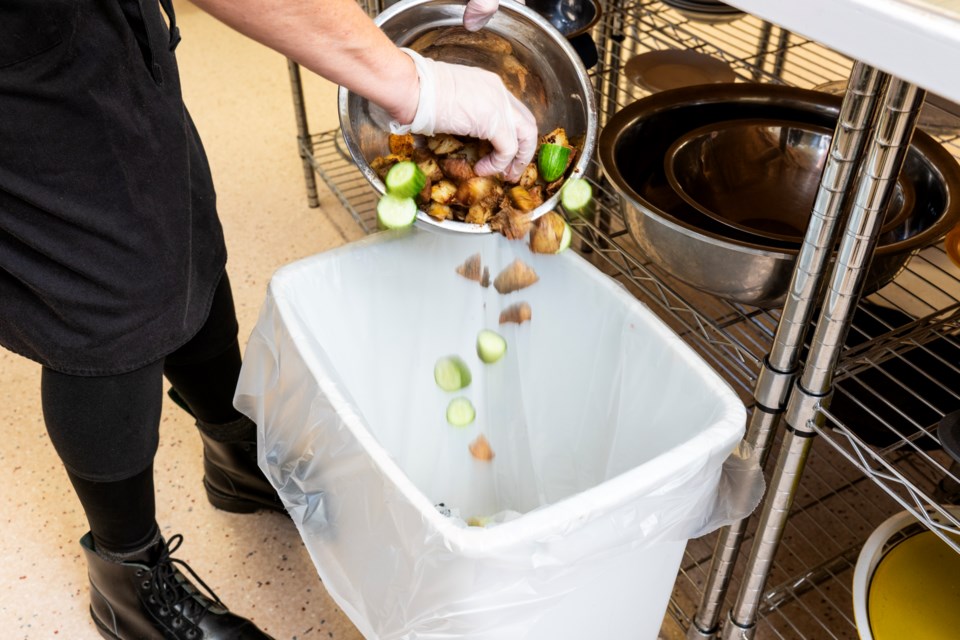Running a food business in Whistler—a restaurant, hotel, or grocery store—is no walk in the park. Between tight margins, seasonal swings, and ever-evolving guest expectations, there’s always something demanding your attention. And when it comes to cutting costs, many businesses focus on pricing, staffing, or sourcing.
But there’s another area that often goes unnoticed: waste.
Food waste is one of the industry’s most persistent—and preventable—issues. Every month, businesses quietly lose thousands of dollars to overordered stock, over-prepped ingredients, and oversized portions. And when that surplus ends up in the black bin, you’re not just wasting food; you’re wasting the labour, energy, and money that went into preparing it, and then paying again to throw it away.
Cost savings and compliance
In Whistler, all food businesses are required to separate food scraps for compost collection. While composting is mandatory, it’s also cheaper than sending waste to the landfill, as long as the compost bin isn’t contaminated.
Still, the biggest savings happen upstream: by preventing waste in the first place.
Global insights, local action
Globally, Four Seasons Hotels and Resorts has implemented AI-powered food waste monitoring systems in more than 600 restaurants to help achieve its goal of halving food waste by 2030. These systems track discarded food in real time, enabling teams to take proactive measures to minimize waste at the source. In just one year, they saved more than 184,000 kilograms of food, equivalent to 520,000 meals.
At Four Seasons Resort and Residences Whistler, the AI system enables teams to make smarter decisions around purchasing, preparation, and portion sizes. For unavoidable waste, a robust system diverts hotel restaurant food waste away from landfills and towards composting. Now, through AWARE’s campaign—in collaboration with GFL Environmental and the Resort Municipality of Whistler—this effort is expanding with a pilot program for organic waste collection from guest suites at the Four Seasons Private Residences. Each Private Residence kitchen is equipped with a clearly labelled organics bin, house attendants are trained in proper sorting, and diversion rates are being monitored to build a system that’s resilient across every season.
Similarly, Marriott Hotels has leveraged AI technology to achieve impressive results. After introducing waste-tracking systems in 53 hotels across the U.K. and Europe, they reduced food waste by 25 per cent in just six months, preventing the equivalent of 486 tonnes of CO2 emissions. By using data to inform ordering, menu-planning, and portion sizes, Marriott’s success echoes the power of measurement-driven waste reduction.
Big brands may have large teams and smart tech, but their success highlights a key takeaway for any food business: when you start measuring waste, you can start managing it.
Even without high-tech tools, small businesses can start by using tally sheets or waste logs to track what’s thrown out, when, and why. This kind of tracking can reveal patterns, like unfinished dishes or consistently returned side salads, and inform easy, practical changes, such as adjusting portion sizes or making extras optional.
Grocery retail brings its own set of challenges and unique opportunities. Shoppers are drawn to full shelves, vibrant colours, and perfect-looking produce. But this expectation of abundance often contributes to waste behind the scenes, and bins filled with unsold but perfectly edible food. At the same time, many in the community face barriers to accessing healthy, affordable food.
So, how can we achieve a better balance?
We can draw inspiration from businesses leading the way with creative and practical solutions.
France’s Intermarché launched an “Inglorious Fruits and Vegetables” campaign, transforming odd-shaped produce into soups and juices and selling them at a discount. Canada’s Loblaws took a similar approach with its “Naturally Imperfect” line, offering misshapen or slightly blemished produce at a discount. These efforts reduce waste while making nutritious food more accessible.
Other solutions are simpler still: grocery stores offering end-of-day markdowns on close-to-expiry products, or platforms like Too Good To Go, which help sell surplus food at a discount. Tim Hortons saved more than eight million baked goods from becoming waste through this app in a single year.
Closer to home, food businesses can donate surplus items like baked goods or packaged foods to the WCSS Food Bank; a powerful, community-first way to reduce waste.
Composting
Of course, not all food can be saved. Plate scraps, expired ingredients, and spoiled produce can still be turned into nutrient-rich compost—but only if bins are properly sorted. Plastic or other contaminants can cause the entire load to be sent to the landfill, driving up costs significantly.
That’s where AWARE comes in
Through our From Waste to Action campaign, we work directly with food businesses to reduce waste, stay compliant, and save money. From practical guidance and tailored action plans to on-the-ground training, our goal is to help you build a system that works. And that keeps working through seasonal shifts and staffing changes.
We know you’ve got a lot on your plate. But tackling food waste doesn’t have to be complicated, and it’s one of the fastest ways to make a positive impact, both for your business and for the planet.
This campaign is made possible thanks to the generous support of GFL Environmental.
AWARE works with the community to deliver bold, evidence-based solutions to the environmental issues that affect Whistler. Learn more at awarewhistler.org




